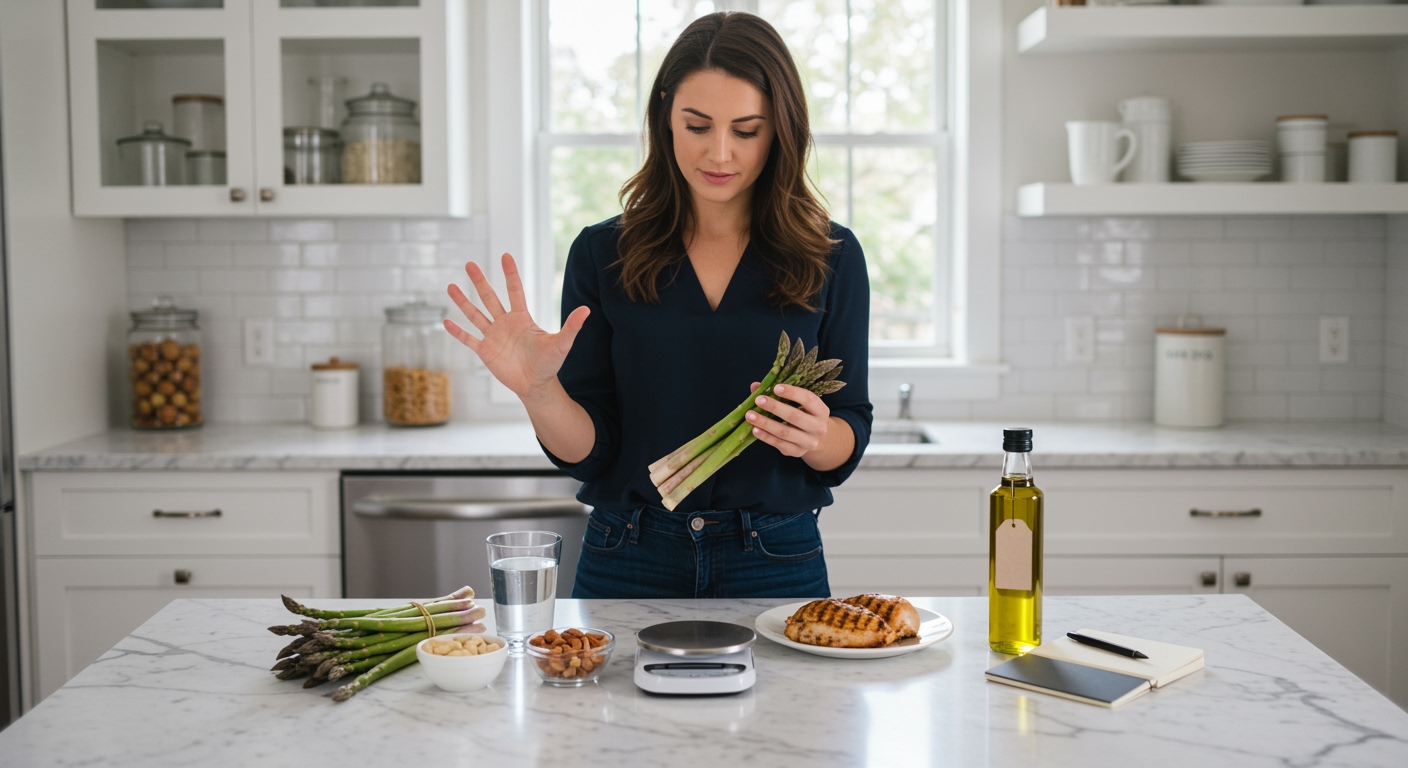✪ Key Takeaway: Asparagus helps PCOS through folate, fiber, and antioxidants that improve insulin sensitivity and reduce inflammation.
Introduction
You walk through the grocery store and see those green spears sitting in the produce section.
Maybe you wonder if this simple vegetable could actually help with your PCOS symptoms that seem to control your daily life.
Hi, I am Abdur, your nutrition coach and today I am going to explain exactly how asparagus can become a powerful ally in your fight against PCOS.
What Makes Asparagus Special For PCOS?
Asparagus contains folate, a B vitamin that plays a crucial role in hormone production and regulation.
Women with PCOS often have elevated homocysteine levels, which folate helps reduce by converting homocysteine into harmless compounds.
This green vegetable also provides glutathione, a master antioxidant that protects your ovaries from oxidative stress.
The fiber content in asparagus slows down sugar absorption, preventing those dangerous insulin spikes that worsen PCOS.
Research shows that asparagus contains compounds called saponins that may help regulate blood sugar levels naturally.
✪ Fact: One cup of asparagus provides 70% of your daily folate needs with only 27 calories.
How Does Asparagus Fight Insulin Resistance?
Insulin resistance sits at the heart of most PCOS cases, making your cells ignore insulin signals.
Asparagus contains chromium, a trace mineral that enhances insulin sensitivity by helping insulin bind to cell receptors.
The inulin fiber in asparagus feeds beneficial gut bacteria that produce short-chain fatty acids.
These fatty acids improve your body’s ability to use glucose effectively, reducing the burden on your pancreas.
Studies indicate that regular consumption of fiber-rich vegetables like asparagus can lower fasting insulin levels by up to 15%.
The low glycemic index of asparagus means it will not cause blood sugar spikes that trigger more insulin release.
✪ Pro Tip: Eat asparagus before your main meal to maximize its blood sugar stabilizing effects.
Can Asparagus Reduce PCOS Inflammation?
Chronic inflammation drives many PCOS symptoms including irregular periods and weight gain.
Asparagus provides quercetin, a powerful flavonoid that blocks inflammatory pathways in your body.
The vitamin E content works alongside glutathione to neutralize free radicals that damage your reproductive organs.
Research demonstrates that asparagus extract can reduce C-reactive protein, a key marker of systemic inflammation.
The asparagine amino acid in this vegetable helps your liver process toxins more efficiently.
When your liver functions better, it can clear excess hormones and inflammatory compounds from your bloodstream.
✪ Note: Cooking asparagus lightly increases the bioavailability of its anti-inflammatory compounds.
What About Asparagus And Hormone Balance?
PCOS creates a hormonal storm with elevated androgens and disrupted ovulation cycles.
The folate in asparagus supports proper DNA methylation, a process crucial for hormone gene expression.
This vegetable contains plant sterols that may help modulate cholesterol levels, which your body uses to make hormones.
Asparagus provides vitamin K, which works with vitamin D to support healthy ovarian function.
The potassium content helps regulate fluid balance and may reduce bloating associated with hormonal fluctuations.
Studies suggest that adequate folate intake can improve ovulation rates in women with PCOS by up to 40%.
✪ Fact: Asparagus contains natural compounds that support your liver’s ability to metabolize excess estrogen.
How Much Asparagus Should You Eat For PCOS?
Most nutrition experts recommend one to two cups of asparagus per day for optimal PCOS benefits.
This amount provides approximately 300-400 micrograms of folate, which meets most of your daily needs.
You can eat asparagus raw in salads, lightly steamed, grilled, or roasted with olive oil.
Cooking methods that preserve the bright green color typically retain more nutrients than overcooking.
Pairing asparagus with healthy fats like avocado or olive oil enhances absorption of fat-soluble vitamins.
Some people experience a harmless change in urine odor after eating asparagus due to sulfur compounds being metabolized.
✪ Pro Tip: Buy asparagus with tight tips and firm stalks for maximum nutrient content and freshness.
The Bottom Line
Asparagus offers genuine benefits for PCOS through its unique combination of folate, fiber, antioxidants, and anti-inflammatory compounds.
Real nutrition happens when you choose foods that work with your body, not against it.
I would love to hear about your experience with asparagus or any questions you have about managing PCOS through nutrition in the comments below.
References
At NutritionCrown, we use quality and credible sources to ensure our content is accurate and trustworthy. Below are the sources referenced in writing this article:
- PMC: Nutritional Management of PCOS
- Research Gate: Asparagus Nutritional Properties
- Sciety: PCOS and Dietary Interventions
- MBIMPH: Folate and Reproductive Health





